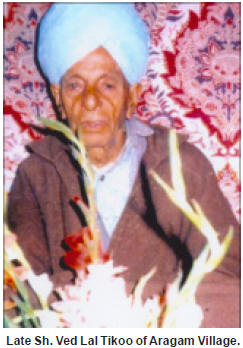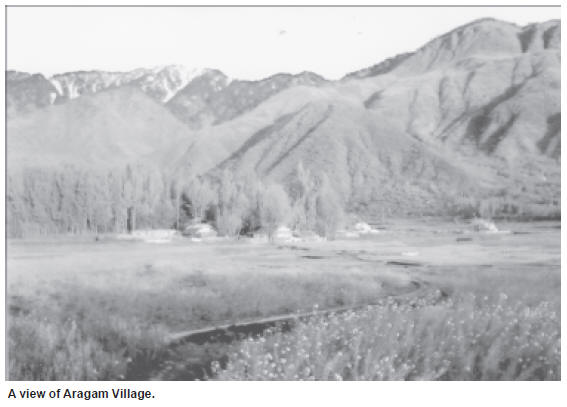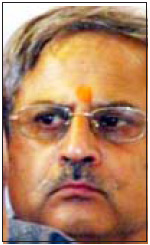Tales
and Legends of Aragam, Bandipore
By
Upender Ambardar
The legends, fables, oral
history accounts, tales of supernatural spirits, heresy stories and stories of
tutelary forest spirits etc. are deeply rooted in the traditional historical and
cultural opinions of a place or a region. They are passed on to the posterity
mostly orally and form a connecting link between the past and the present times.
They sometimes become narratives of a particular place and it's people. They may
possess elements of divinity and supernaturalism, though they may not be
evidenced by documentary and supporting facts. They usually have an element of
mystery and may possess a legendary pull and fascination for the native people.
In a plain speak, they can
be said to be based on diverse emotional offshoots and legacy of centuries of
faith and belief.

Aragam
is an obscure picturesque
village nestled in the lushness of the green foliage, being located about 50 kms
from Srinagar on
Srinagar-Bandipore route. Now a part of the newly carved-out Bandipore district,
it is at a distance of five kms. from Bandipore town and about twenty five kms.
from Sopore. Aragam mainly comprises of plain lands and is surrounded by wooded
mountains on three sides, locally known as Animbar, Fakhnar and Lungmarg
forests. The village derives it's name from a riverlet which flows through the
village. Adjacent to the lungmarg forests is a vast stretch of imposing grazing
ground called 'Ziasun'-which is a lively ambience of pastoral life. The
surrounding mountains support majestic pine and Deodar forests, whileas wild
walnuts, chinar, willow and popular trees can be spotted everywhere in the
village lands. Paddy constitutes the main staple crop of the village though
isolated pockets also support maize and oil seeds.
Aragam also has
substantial stretches of orchards bearing apple, pears, cherry, walnuts, and
almond fruit trees. The village has about 2,000 households, out of which about
ten were Kashmiri Pandit families; the rest being Muslims. All the Kashmiri
Pandit families prior to their forced migration in 1990 were agriculturists and
orchardists with livestock forming an additional source of income. Aragam has a
high literacy rate with most of the Pandit families serving in Government
departments.
The family of late Sh.
Tika Lal Tikoo, who was a head munshi in the forest department during
Maharaja Hari Singh's time is a well-known family of the village. He had three
sons, namely Sh Dwarika Nath Tikoo (agriculturist), Sh. Manmohan Tikoo, an
ex-servicemen of the J&K light infantry and Sh Chaman Lal Tikoo, who retired
from the BSF. The family of Sh. Divram Tikoo (agriculturist) likewise had
three sons, namely Sh. Rattan Lal Tikoo (M.A, M.Ed) being first position holder
in M.Ed) who served in the state education department, Sh Girdhari Lal Tikoo (a
retired employee from the J&K Secretariat) and Sh. Kanya Lal Tikoo (M.Sc.
Physics) a senior Lecturer in the State Education Department. Another Pandit
family was that of Sh Gulab Ram Raina (agriculturist), who had two sons
namely Sh. Somnath Raina ( a retired police inspector) and Sh. Manmohan Raina,
who worked in the Block Development Office. The remaining Pandit families were
those of Sh. Shamboo Nath Nehru, Sh. Madhusudhan Nehru and Sh.
Shyam Lal Nehru, all of them being real brothers. Their children Sh. Bushan
Lal Nehru and Sh. Ashok Nehru served in the state departments. In contrast to
the Tikoo families, the Nehrus are not original residents of the village. They
are said to have migrated to Aragam village about two centuries back from Naroo
village in tehsil Kishtwar of Doda district. The village Aragam has been a
witness to three plunders locally known as 'Baem Loot', 'Pathan Loot' and 'Qabali
Loot'. The 'Baem' were ferocious war tribe men of the frontier areas, who are
said to have resorted to loot and plunder hundreds of years back.
During the Qabali tribal
raid in 1947, the Kashmiri Pandits of Aragam could save their skin as they fled
to the adjacent mountains. But in the nearby Bandipore Kharpora town, nine
members of a Kashmiri Pandit family of Sh. Sansar Chand Sadhu (Choudhari) were
brutally murdered by the tribal men. They were lined-up in a row and subjected
to a hail of bullets. Late Sansarchand nicknamed as Chowdhari was a well-known
trader of his time, whose business interests extended upto Gilgit. He used to
trade in 'Kishmish', dates, hazzle and cashew-nuts business and in return would
send Kashmiri spices to the frontier province.
As per the village lore of
Aragam, about two and a half centuries back, a Kashmiri Pandit namely Sh. Gash
Ram lived here and was endowed with spiritual powers. Besides being a known
agriculturist, he had about nine hundred livestock. He had acrimonious relations
with Akal Bhat, who in order to settle scores with him invited the professional
tribal plunderers called 'Baem' to Aragam village.
To escape from the wrath,
Gash Ram packed off his two daughters and two sons to the neighbouring place,
while the remaining two sons along with their entire livestock took shelter in
the Lungmarg forests. They hid themselves in the mountain cave, which even today
is now as Gash Ram's hut. Gash Ram was caught and as punishment he was suspended
from a tree by means of his skull hair-luft (chaog).
Astonishingly, he survived
the near-death ordeal. Later-on he was handed-over to a executioner for being
killed. He bribed him by giving an appreciable part of his cattle and in the
bargain got a lease of life. Sh. Gash Ram had five sons--Sahaj Ram, Prakash Ram,
Raja Ram, Siraj Ram and Balram. Among them late Sh. Raja Ram and Sh Sahaj Ram
had saintly disposition and possessed exceptional spiritual powers. Both of them
were ardent devotees of Sagar Raz Bhairav, the presiding deity of the village
Aragam.
As per the village lore,
both the brothers would enter into divine communion with Sagar Raz Bhairav. To
ensure wrinkle free smoothness of the turban cloth, both Raj Ram and Sahaj Ram
would hold it in their hands till Sagar Raz Bhairav tied turban on their head.
On special occasions, they would keep offerings of food in a thali for Sagar Raz
Bhairav. The thali would immediately vanish from sight and it had to be
collected afterwards from the adjacent cremation ground obviously after Sagar
Raz Bhairav had accepted the offering. The village cremation ground (Razbal) was
about a hundred yards away from their residence. Adjacent to it was a piece of
land where Raz-Kath the sacrificial religious offering of sheep was performed in
honour of the presiding deity of the village. This piece of land is even now
known as 'Rajun', signifying the ownership of it to the saint Raj Ram Tikoo. An
attempt made sometime back by a native Mohammad Tilwani to cultivate it made him
bedridden for a couple of months.
It was seen as an
expression of displeasure and annoyance shown by Sagar Raz Bhairav. The latter
regarded as the presiding deity of the villages of Aragam, Garoora, Brar,
Chittibandi, Gund, Dechan, Tantraypora and vast area extending right upto the
Wular Lake.
The Late Tika Lal Tikoo,
a direct descendant of the said family was also a man of spiritual pursuits.
Being a great devotee of the village Bhairav himself, he had immense faith and
reverence for him. He was said to converse with the Bhairav in his dreamful
state during night as strange and ununderstanble discourse could be heard near
his room. The villagers believed that late Sh. Tika Lal would often be spotted
in the village cremation ground (Razbal) in his astral form in the company of
Sagar Raz Bhairav and his associates. It came to light when a Muslim lady
inadvertently stepped inside the village cremation ground in search of her lost
cow. She was bewildered to spot late Sh. Tika Lal sitting in the company of
persons supporting white cloaks (pheran) and white turbans.
Due to his spiritual
powers, late Sh. Tika Lal was quite popular in the village Aragam and its
neighbourhood as a spiritual healer for he could successfully cure persons
afflicted with various ailments like infectious boils, jaundice, headache, high
fever and those possessed by evil spirits. Once a neighbour, Mr Ghulam Rasool
Bhat's daughter Shama got possessed by an evil spirit. She was taken to a local
Muslim priest for cure. After having failed to drive-off the evil spirit, the
Peer suggested Shama to be taken to Tika Lal for cure. On hearing his name, the
civil spirit is said to have communicated not to bother Sh. Tika Lal as he would
leave Shama's body provided her father promised to make an offering of turmeric
rice at the 'Razbal'. Sh. Tika Lal departed from this world in July 1990. The
Pandit community of Aragam also became the victims of the militants' furry in
1990, when the wife of Sh. Kanya Lal Tikoo namely, Mrs Girja Tikoo (Babli) was
killed by the militants. She was a laboratory assistant at Govt. High School, Trehgam.
(Kupwara). At the height of the militancy she was abducted and subsequently
killed when she had gone to collect her salary at Trehgam.
On her way back, she had
to make a night halt at Tikker village in the house of her childhood female
friend. Tikker was also incidentally her parental village. She was kidnapped by
her friend's militant turned kins. She was taken to an adjacent electric
saw-mill and mercilessly cut into two haves upto her chest by the electric-saw
and her dead body was later-on thrown near a bridge in Tikker. This brutal
slaying sent a chilling message to the Pandit families of Aragam and the
adjoining villages, who were left with no alternative but to migrate from their
ancestral homes in order to save their honour and skin.
The village Aragam has an
ancient temple by the side of a holy spring, which has a Shivling and a stone
idol of the Goddess Parvati. The village temple complex has plenty of willow and
popular trees. Another village holy spring called 'Brari Maji Hund Nag' has one
kanal of land attached to it, which abounds in majestic chinar trees. The
villagers irrespective of their caste and creed would offer the milk of their
first delivered cow to the holy spring out of reverence for it.
About four kms away from
the village Aragam is a hillock known by the name of Shank Paul. A hermit
of the same name is said to have done hard penance here hundreds of years back.
It had a few pious springs in it's vicinity, some of which have now dried-up.
The village lore says that any unholy misdeed committed in the area would result
in instant rainfall in earlier times.

A well known Muslim saint
and Sofi poet, Lala Sahib Aragami was a native of Aragam village. He lived upto
the year 1984. In one of his Kashmiri couplets, the poet eulogises the virtues
of a Kashmiri Pandit,
"tan darith.......tah
zahnar".
In another Kashmiri verse,
the said poet exhorts a Kashmiri Pandit girl to have unrestrained devotion for
her God as her favourite deity i.e. enshrined in the stone idol itself,
"Bata Koori Vate Kanie
Manj Chuai Dai,
Karee Pooja, Yinai
Mushravak Lai."
Likewise being a devotee
of the Goddess Parvati, he expresses his reverence for the Goddess in the
following lines,
"Haran Doh Gaie Praran
Yaeti Parvati Lo,
Sonihaer Paad Yaepaar Trav
Lotie Parvati Lo".
A single Kashmiri Pandit
family of Sh. Manmohan Nath Tikoo, an agriculturist and an ex-serviceman still
resides in the village Aragam. One of his sons Sh. Rattan Lal Tikoo is presently
working as a government teacher there, whileas the second one Sh. Rajender Tikoo
who has done Diploma in weaving and tailoring is a migrant at Batal-Ballian,
Udhampur Migrant Camp. The Isht Devi of Tikoo families of Aragam is Tripur
Sundri and her birthday called 'Tikchoram' is celebrated on Magh Shukla Paksh
Chiturthi by offering turmeric mixed rice and goat's liver (Tahar-Charbvan) to
the family deity. The Kashmiri Pandits of Aragam and the adjoining villages used
to celebrate all the religious festivals with the usual religious fervour prior
to their forced migration from Kashmir.
Source: Kashmir
Sentinel
| 















No one has commented yet. Be the first!